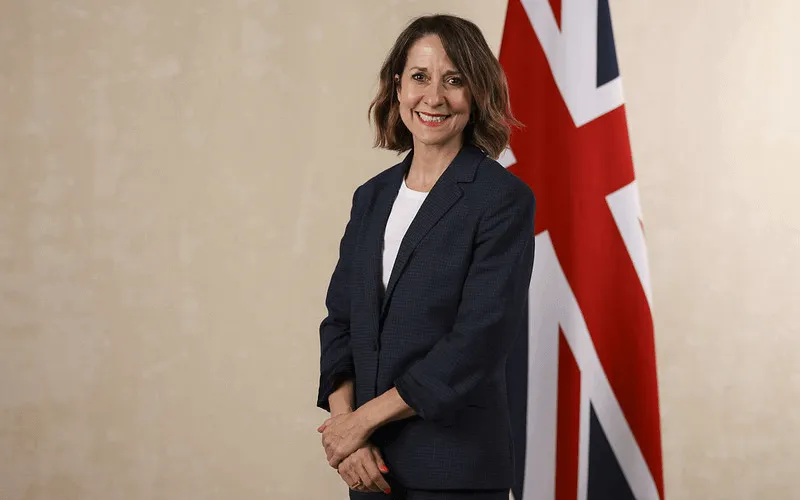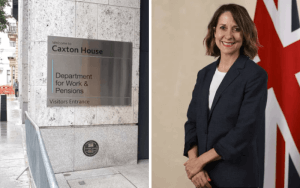Work and pensions secretary Liz Kendall had to ask the BBC to alter a news story that suggested she wanted to send employment advisers onto mental health wards, after she failed to dismiss the idea during an interview.
Disability News Service (DNS) has obtained a transcript of the interview that took place in October between Kendall (pictured) and the BBC’s economics editor, Faisal Islam, as well as copies of emails exchanged between government press officers and the BBC.
The transcript and emails – obtained by DNS under the Freedom of Information Act – show that Kendall failed to make it clear during the interview that she did not want to send employment advisers onto mental health wards.
It was only after the BBC published a news story on 16 October, co-written by Islam, that suggested that “job coaches could visit seriously ill patients on mental health wards” that a Department for Work and Pensions (DWP) press officer emailed the BBC to ask for the claim to be removed.
The DWP press officer told the BBC: “To be clear, the Secretary of State didn’t say that the government would be placing the work coaches in hospitals or on hospital wards.
“Rather, she outlined plans to join up employment supports with mental health services in the community.
“The current wording suggests that this would be within a hospital setting. This is not what the Secretary of State said.”
This may reassure many disabled people who were concerned at apparent plans to send employment advisers or even DWP work coaches into mental health hospitals to push them towards work.
But the interview transcript also shows that it was Kendall’s blundering response to a question from Islam that led to the BBC publishing the claim about mental health wards.
Islam had asked Kendall: “We’re hearing things like putting job coaches in hospitals. I mean, that’s [sic] that sounds slightly surreal, isn’t it? I mean, people are waiting for…”
According to the transcript provided by DWP, Kendall did not rule out sending job coaches into hospitals, but appeared instead to dismiss Islam’s concerns about such a policy.
The DWP transcript shows her replying: “Absolutely not let me tell you just this.
“Just this week in my own city, I went to in [sic] an employment support service run by our mental health team.
“This is for people with serious mental health, serious. And the results of getting people into work have been dramatic, and that the evidence clearly shows that it is better for their mental health.
“They have fewer relapses, and they spend less time in hospital.
“So those Employment Advisors, if you actually speak to the people who felt that they were written off they didn’t have have [sic] a chance, the support they got.
“The results are really strong. So it is something that we really need to focus on, putting those Employment Advisors into our mental health services.
“It is better for people. It’s better for the economy, but we just have to think in a different way.”
The BBC story was later amended – on DWP’s request – to remove the suggestion that Kendall wanted to send work coaches into mental health wards, to remove her comment about putting employment advisers into mental health services, and to change the headline.
The grassroots, user-led mental health group Recovery in the Bin (RiTB) blamed both Kendall and the BBC for allowing the apparently false claim about job coaches on mental health wards to be published.
Rick Burgess, an RiTB spokesperson, said that “in a sensitive policy area where lives are in the balance, both the media and government have to do a lot better otherwise we can reasonably surmise they do not care the harm they cause to us”.
Picture of Liz Kendall by Lauren Hurley/No 10 Downing Street
A note from the editor:
Please consider making a voluntary financial contribution to support the work of DNS and allow it to continue producing independent, carefully-researched news stories that focus on the lives and rights of disabled people and their user-led organisations.
Please do not contribute if you cannot afford to do so, and please note that DNS is not a charity. It is run and owned by disabled journalist John Pring and has been from its launch in April 2009.
Thank you for anything you can do to support the work of DNS…

 ‘Disastrous’ cuts bill that leaves legacy of distrust and distress ‘must be dropped’
‘Disastrous’ cuts bill that leaves legacy of distrust and distress ‘must be dropped’ Ministers are secretly considering means-testing PIP, DWP admits, despite pledge in green paper
Ministers are secretly considering means-testing PIP, DWP admits, despite pledge in green paper